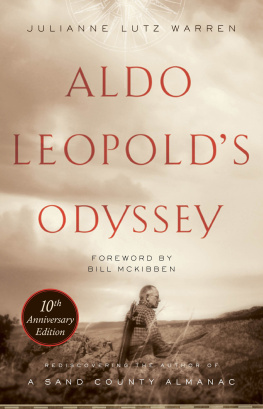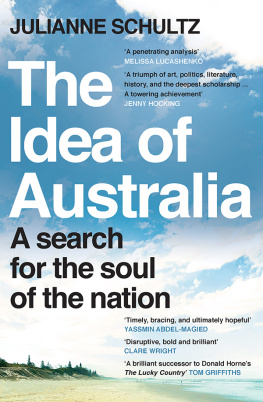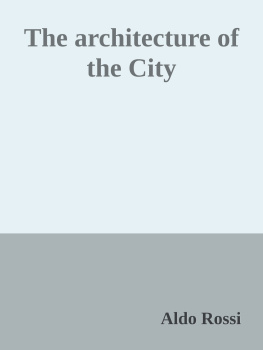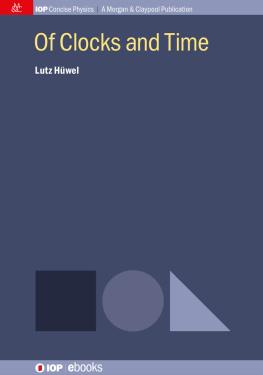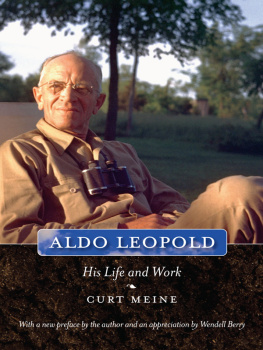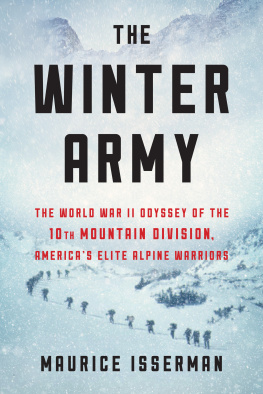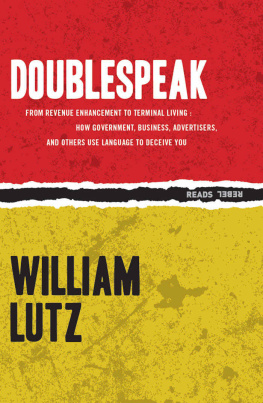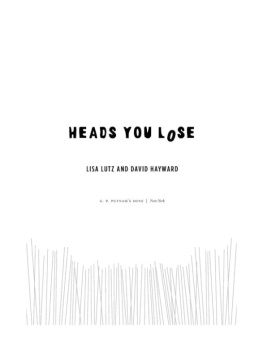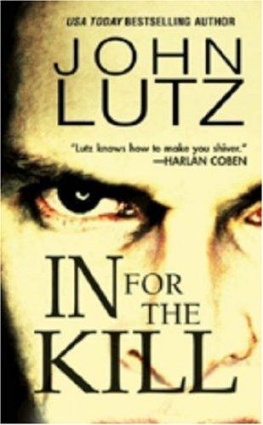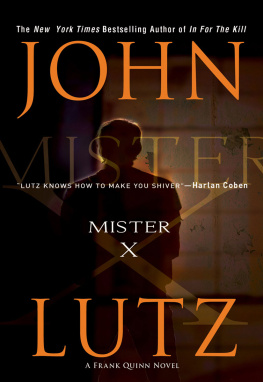Julianne Lutz Warren - Aldo Leopolds Odyssey (10th Anniv. Ed)
Here you can read online Julianne Lutz Warren - Aldo Leopolds Odyssey (10th Anniv. Ed) full text of the book (entire story) in english for free. Download pdf and epub, get meaning, cover and reviews about this ebook. year: 2016, publisher: Island Press, genre: Romance novel. Description of the work, (preface) as well as reviews are available. Best literature library LitArk.com created for fans of good reading and offers a wide selection of genres:
Romance novel
Science fiction
Adventure
Detective
Science
History
Home and family
Prose
Art
Politics
Computer
Non-fiction
Religion
Business
Children
Humor
Choose a favorite category and find really read worthwhile books. Enjoy immersion in the world of imagination, feel the emotions of the characters or learn something new for yourself, make an fascinating discovery.
- Book:Aldo Leopolds Odyssey (10th Anniv. Ed)
- Author:
- Publisher:Island Press
- Genre:
- Year:2016
- Rating:3 / 5
- Favourites:Add to favourites
- Your mark:
- 60
- 1
- 2
- 3
- 4
- 5
Aldo Leopolds Odyssey (10th Anniv. Ed): summary, description and annotation
We offer to read an annotation, description, summary or preface (depends on what the author of the book "Aldo Leopolds Odyssey (10th Anniv. Ed)" wrote himself). If you haven't found the necessary information about the book — write in the comments, we will try to find it.
Aldo Leopolds Odyssey (10th Anniv. Ed) — read online for free the complete book (whole text) full work
Below is the text of the book, divided by pages. System saving the place of the last page read, allows you to conveniently read the book "Aldo Leopolds Odyssey (10th Anniv. Ed)" online for free, without having to search again every time where you left off. Put a bookmark, and you can go to the page where you finished reading at any time.
Font size:
Interval:
Bookmark:
About Island Press
Since 1984, the nonprofit organization Island Press has been stimulating, shaping, and communicating ideas that are essential for solving environmental problems worldwide. With more than 1,000 titles in print and some 30 new releases each year, we are the nations leading publisher on environmental issues. We identify innovative thinkers and emerging trends in the environmental field. We work with world-renowned experts and authors to develop cross-disciplinary solutions to environmental challenges.
Island Press designs and executes educational campaigns in conjunction with our authors to communicate their critical messages in print, in person, and online using the latest technologies, innovative programs, and the media. Our goal is to reach targeted audiencesscientists, policymakers, environmental advocates, urban planners, the media, and concerned citizenswith information that can be used to create the framework for long-term ecological health and human well-being.
Island Press gratefully acknowledges major support of our work by The Agua Fund, The Andrew W. Mellon Foundation, The Bobolink Foundation, The Curtis and Edith Munson Foundation, Forrest C. and Frances H. Lattner Foundation, The JPB Foundation, The Kresge Foundation, The Oram Foundation, Inc., The Overbrook Foundation, The S.D. Bechtel, Jr. Foundation, The Summit Charitable Foundation, Inc., and many other generous supporters.
The opinions expressed in this book are those of the author(s) and do not necessarily reflect the views of our supporters.


Copyright 2016 Julianne Lutz Warren
First Island Press cloth edition, November 2006
First Island Press paperback edition, February 2008
All rights reserved under International and Pan-American Copyright Conventions. No part of this book may be reproduced in any form or by any means without permission in writing from the publisher: Island Press, 2000 M Street, Suite 650, Washington, DC 20036.
ISLAND PRESS is a trademark of the Center for Resource Economics.
Library of Congress Control Number: 2016938110

 Printed on recycled, acid-free paper
Printed on recycled, acid-free paper
Manufactured in the United States of America
10 9 8 7 6 5 4 3 2 1
Keywords: Anthropocene; land health; land ethic; ecological conscience; Conservation Foundation; wildlife management; U.S. Forest Service; Baraboo, Wisconsin; Gila National Forest
For
Nina Leopold Bradley
(19172011)
and for Jim
Contents

Foreword

Aldo Leopold is one of the great figures of American intellectual history, a truly original thinker who serves, it seems to me, as a hinge figure in the progression of thinking about the natural world and our place in it.
Before him, there were heroic figures like John Muir, who invented the grammar and vocabulary of wildness that birthed the environmental movement. It was a world of awe and splendor, and it helped people see the world in a new and useful waythe charge he provided (and the Sierra Club he founded) drove the movement through much of the twentieth century.
Though Leopold was clearly interested in wilderness (he helped found the Wilderness Society, in fact), his was a quieter vision of the world, and perhaps a more radical one. He realized that there was no way to wall man off from the rest of the worldinstead of the Yosemite backcountry, he eventually retreated to the farmlands of Wisconsin, where he used the ecological insights he had developed as the father of wildlife management to think about our species as one among many. The land ethic that emergedthe idea that a thing is right when it tends to preserve the integrity, stability, and beauty of the biotic communitywas a first crucial step in moving environmental thinking beyond Thoreauvian individualism, toward a sense of land communitythat is, toward land health. In his wake came Rachel Carson, and in our own time, above all, Wendell Berry. The locus of environmental thinking now includes not just the national park but the farmers market; not just the high Sierra vista, but the first few inches of soil. It is no wonder, I think, that Aldo Leopold died fighting a fire on a neighbors farm, because neighborsof every kindwere of great importance to him.
This remarkable volumethe deepest and most challenging explication of Leopolds thinking that I knowis a reminder that we are only beginning to understand the depth of his thought. Indeed, the authors discovery, for the new edition, of the global thinking emergent in Leopolds final years helps tie him more directly to the battle to preserve the climatedoubtless the greatest fight in human history.
But Leopolds significance has been growing with every generation in any event. A Sand County Almanac finds new readers with each passing year. The sense that we could re-inhabit this continent and this planet, and do so in a way that heals instead of damages, that heeds instead of ignores, that makes the highest and not the lowest use of our traits as a speciesthat excitement flows through each page of this work. Leopold is low-key; he speaks in a dignified register; and yet the adventure on which he embarked remains one of the most remarkable in human history.
Bill McKibben
January 24, 2016
Ripton, Vermont
Preface

I first heard of Aldo Leopold when I was a graduate student in wildlife ecology at the University of Illinois. One day, in the midst of a conversation about some research questions, a colleague at the Illinois Natural History Survey pulled from his shelf a copy of A Sand County Almanac, offering me my first discovery of its author. I read it and found the book interesting, but I did not at the time grasp Leopolds significance.
I continued with my education, doing fieldwork, collecting and analyzing data, attending classes in wildlife science, statistics, and as many ologies as I could fit in. I loved what I was learning, but I began to feel increasingly unsettled. Science could go far in helping people understand the world, but in its objectivity it could never go far enough in making the modern world a more pleasant and healthier place in which to live. For that, something else was needed. At this point I happened into a class on conservation literature, and it was here that I rediscovered Leopold. I learned about Leopold in the context of the history and philosophies of the conservation and environmental movements. And I began to see him not just as a careful observer of nature but as something moreas someone uniquely insightful and clear minded and as an artist with an unusual gift for prose. Here, too, like many others, I began to see in Leopolds work what might be needed, in addition to good science, to help promote the beauty of nature.
Leopold has become something of a household icon of the conservation movement, perhaps most recognized for his land ethic, expressed succinctly in his oft-quoted phrase A thing is right when it tends to preserve the integrity, stability, and beauty of the biotic community. It is wrong when it tends otherwise. But how, I wondered, did Leopold come to call for a land ethic in the first place; what did Leopold mean by those words; and, practically speaking, what did he think it might take for humans to dwell on the land yet at the same time preserve its integrity, stability, and beauty? And what did he mean by his less talked about though central ideawhat he came to call land healthan evolving vision that included human-inhabited places?
Next pageFont size:
Interval:
Bookmark:
Similar books «Aldo Leopolds Odyssey (10th Anniv. Ed)»
Look at similar books to Aldo Leopolds Odyssey (10th Anniv. Ed). We have selected literature similar in name and meaning in the hope of providing readers with more options to find new, interesting, not yet read works.
Discussion, reviews of the book Aldo Leopolds Odyssey (10th Anniv. Ed) and just readers' own opinions. Leave your comments, write what you think about the work, its meaning or the main characters. Specify what exactly you liked and what you didn't like, and why you think so.

